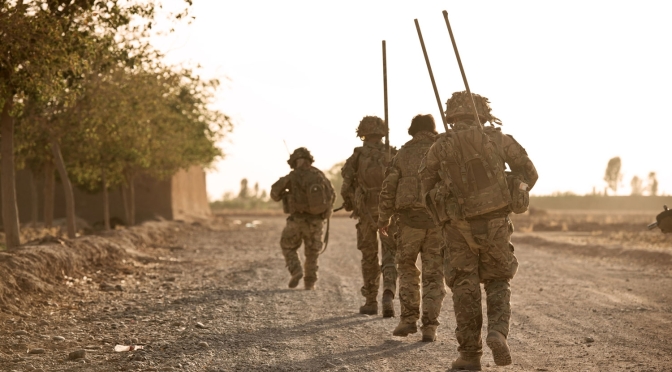According to Forces TV, the MoD has released a one-off report detailing the injuries suffered by UK troops during Operation Herrick in Helmand. Improvised explosive devices (IEDs) accounted for 5,313 ‘events’ resulting in traumatic injury to 1, 982 British service personnel.
By the time I arrived in Afghanistan in January 2012 the IED was the Taliban weapon of choice. In nine months the combined Afghan, Danish and British force with whom I worked suffered 117 IED strikes and discovered a further 241 IEDs:
‘As the Grenadiers or fighting Ribs of Inkerman Company knew only too well, living with the constant possibility that your every next step may trigger an IED slowly and inevitably degrades the human spirit. It pervades every waking moment and is a constant and exhausting factor. Every breath must be carefully savoured lest it be your last. Every footfall must be critically considered and evaluated before being placed. Each tread is committed with unyielding trepidation. The euphoria of one safe step is immediately replaced by apprehension at the next and so on and so on until …
According to Aristotle, “Fear is pain arising from the anticipation of evil.” Not being as erudite as the great Greek polymath, for me, fear is the ever‑present possibility that my fellow man has carefully concealed a yellow palm oil container packed with a volatile mixture of ammonium nitrate and aluminium in the ground beneath my feet. It is the screaming anticipation that my very next step will initiate this crude mixture and a dark and powerful blast will remove my legs and my manhood and leave me bloodied and broken in the dirt.
As friends and colleagues fall victim to these devices and are forever mutilated or killed in circumstances or locations you have visited yourself, it becomes possible to reflect not that you have been lucky, but that you must be next. It’s a conviction that slowly and inexorably takes hold in the darkest recesses of your exhausted mind and grows like a malignant cancer.
During the course of my patrols in the Gap I witnessed young Guardsmen so overcome with fear that they would vomit at the front gates of the base before bravely stepping off on a patrol they have convinced themselves will be their last. I have also seen men so exhausted by constant vigilance that they lose all reason and stumble about blindly, no longer caring if they live or die.
Both are equally distressing to observe. But in this I was not always a mere observer.
On one patrol I was myself so overwhelmed by the certainty that I was about to take my last few steps on this earth that I became rooted to the spot unable to move either forward or back. It took the gentle and patient persuasion of a better man half my age to guide me, temporarily broken and useless, to safety.
I would hear IEDs detonated by other callsigns, sometimes less than a kilometre distant. Or I would join a platoon for a few days, to learn soon afterwards that one of their number had been grievously wounded.
One device claimed the legs of another London Regiment soldier, Lance Corporal John Wilson with whom I’d trained and prepared for deployment, another took the foot of Jay, an SF soldier whom I’d got to know. Jay had postponed his end of tour date when yet more faults on the ageing RAF Tristar fleet had delayed his replacement’s arrival into theatre.
I tried to convince him that he didn’t need to go back out on the ground but he ignored my advice. When the news came through that his patrol had been whacked by an IED and had a serious casualty I instantly feared it must be him, and so it proved to be. Some reckoned he’d been lucky – the device only partially detonated and his injuries could have been much worse – but I knew that Jay’s luck had run out with his chuff chart.’
SPIN ZHIRA: Old Man in Helmand is the unauthorised, unvarnished and irreverent story of one man’s midlife crisis on the front line of the most dangerous district in Afghanistan where the locals haven’t forgiven the British for the occupation of 1842 or for the Russian Invasion of 1979. Of course, all infidels look the same so you can’t really tell them apart.













